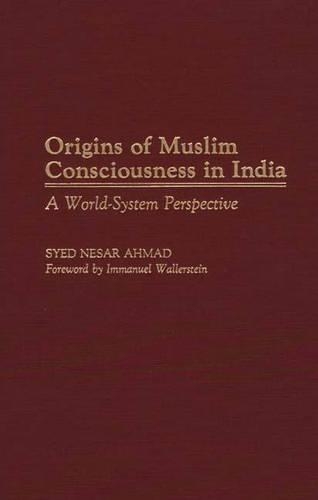
Origins of Muslim Consciousness in India: A World-System Perspective
(Hardback)
Publishing Details
Origins of Muslim Consciousness in India: A World-System Perspective
By (Author) Syed Nesar Ahmad
Bloomsbury Publishing PLC
Praeger Publishers Inc
30th August 1991
United States
Classifications
Tertiary Education
Non Fiction
Islam
Hinduism
Social and cultural history
954.00882971
Physical Properties
Hardback
328
Description
This debate over the underlying causes of the clash between Hindus and Muslims which continues to polarize India is the central concern of this volume. Syed Nasar Ahmad challenges popular viewpoints regarding the Hindu-Muslim conflict by asserting that, although intrinsic differences between the two cultures do exist and this schism has been somewhat fueled by the cultural conditions in colonial India, the emergence and growth of the conflict is primarily the result of social and economic forces, both global and regional, which caused initial differences to intensify into cultural rift. Ahmad presents a thorough account of Indian history during the 19th and 20th centuries, analyzing how the relationship between Hindus and Muslims has been shaped by each significant political and social development. Evidence of both selectivism and assimilation between Hindus and Muslims, a concept not previously accepted, is apparent throughout the history, and the issue of the origins of the identity of the Muslim consciousness which now exerts such influence in the region, is explained in terms of the interaction of religious, social cultural, and global factors. By viewing India's struggle for its post-colonial identity from this comprehensive historical perspective, the author hopes to illuminate some of the fundamental causes of similar conflicts throughout the former colonial world.
Reviews
No topic in South Asian history has generated more controversy than the processes by which the British Raj was transformed into two (now three) mutually antagonistic successor-states. Ahmad set himself the task of trying to explain the circumstances that brought into being (against the backdrop of a faltering Raj and the triumphant progress of the Congress movement) a distinct Indo-Muslim sense of cultural self-consciousness and communal identity. His chosen method was not to cull the extensive primary sources (e.g. official records, private correspondence, etc.), but to offer a critique of the secondary literature (often highly contentious), and thereby find his way to his own interpretation. Because of Ahmad's untimely death during the 1986 Pam Am hijacking in Karachi, the present work is, in essence, his dissertation, which was seen through the press by his widow. The result is a stimulating, if idiosyncratic contribution to the debate. Graduate level.-Choice
The book reflects rigorous and massive effort in research; one learns much about the region and the period. In an era of extensive scholarly interest and writing on nationalism, the breadth and acumen of Ahmad's work deserve appreciation.-Contemporary Sociology
"The book reflects rigorous and massive effort in research; one learns much about the region and the period. In an era of extensive scholarly interest and writing on nationalism, the breadth and acumen of Ahmad's work deserve appreciation."-Contemporary Sociology
"No topic in South Asian history has generated more controversy than the processes by which the British Raj was transformed into two (now three) mutually antagonistic successor-states. Ahmad set himself the task of trying to explain the circumstances that brought into being (against the backdrop of a faltering Raj and the triumphant progress of the Congress movement) a distinct Indo-Muslim sense of cultural self-consciousness and communal identity. His chosen method was not to cull the extensive primary sources (e.g. official records, private correspondence, etc.), but to offer a critique of the secondary literature (often highly contentious), and thereby find his way to his own interpretation. Because of Ahmad's untimely death during the 1986 Pam Am hijacking in Karachi, the present work is, in essence, his dissertation, which was seen through the press by his widow. The result is a stimulating, if idiosyncratic contribution to the debate. Graduate level."-Choice
Author Bio
SYED NESAR AHMAD taught in Pakistan, Canada, and the United States before receiving his doctoral degree in Sociology from SUNY, Binghamton. He was killed in a hijacking in Pakistan on September 5, 1986, while returning from the World Sociology Congress in New Delhi. Ahmad published numerous articles on third world development, the Middle East, and South Asia in such journals as Review, Third World Forum, Pakistan Forum, and the McGill Daily newspaper. He also contributed chapters to a variety of books on political economy. At the time of his death he was a faculty member at Friends World College in Long Island, New York.
